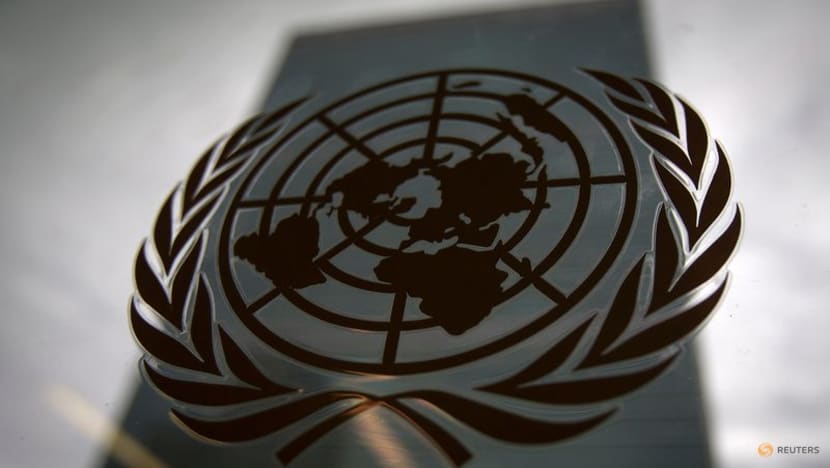Rules-based global order at risk of degenerating into law of the jungle: Vivian Balakrishnan
“A new world order is taking shape and characterised by profound unpredictability, instability and volatility,” says Singapore's Foreign Affairs Minister.

The United Nations headquarters building is pictured through a window with the UN logo in the foreground. (Photo: Reuters)

This audio is generated by an AI tool.
SINGAPORE: The rules-based international order that has prevailed for 80 years is at risk of degenerating into the "law of the jungle" where “might makes right”.
And in its place, a new world order is taking shape, characterised by profound unpredictability, instability and volatility, said Singapore's Foreign Affairs Minister Vivian Balakrishnan on Monday (Mar 3).
“The world is now shifting from unipolarity to multipolarity, from free trade to protectionism, from multilateralism to unilateralism, from globalisation to hyper-nationalism, from openness to xenophobia, from optimism to anxiety,” he said, while laying out his ministry's spending plans for the year.
Big powers are taking a narrower view of their national interests and adopting a more transactional, sometimes coercive, approach, Dr Balakrishnan told parliament.
Add to that a lack of strategic trust between them and a deep anxiety to stay ahead of each other, and the result is sharper rivalry, autarky and the fracturing of global supply chains.
“Countries have turned inwards, ostensibly in the name of national security, resilience and de-risking, in order to secure their individual interests in this turbulent environment,” Dr Balakrishnan said.
"We may, in fact, be reverting to a time when the world is divided into blocs controlled by big powers, and by definition, this must be the loss of choice and autonomy for small states."
A NEW WORLD ORDER
In his speech, Dr Balakrishnan then listed three broad sets of implications for Singapore: Trade, war and the global commons.
On the economic front, he pointed to how the new United States administration and other major countries are using restrictions such as tariffs to address non-trade related policy objectives, and applying them to partners, competitors and adversaries alike.
"Tit-for-tat tariffs by other countries can easily escalate into a global trade war," Dr Balakrishnan warned.
Singapore has not been directly targeted, but tariffs will have a major impact on the volume and patterns of world trade, and significantly affect the country as a transshipment hub.
But the problems go beyond just trade and tariffs, he added.
Singapore, as an open economy, allows companies from all over the world to operate in the country as long as they play by the rules, said Dr Balakrishnan.
But this paradigm is now at risk, as technology becomes a focal point for strategic contestation between the big powers, and several countries impose restrictions and export controls on semiconductor chips, critical minerals and data.
Amid heightened scrutiny over advanced technology, Singapore may be criticised for working with or hosting companies and officials from one side or the other or both, the minister noted.
“There will be centrifugal pressure from all sides that will make it increasingly hard for us to operate, and it will threaten our raison d’etre as an open hub.”
The world is now shifting - from unipolarity to multipolarity, from free trade to protectionism, from multilateralism to unilateralism, from globalisation to hyper-nationalism, from openness to xenophobia and from optimism to anxiety. Foreign Affairs Minister Vivian Balakrishnan, who highlighted this shift in parliament on Monday (Mar 3), warned that this is not merely a sudden temporary change in diplomatic weather. “This is geostrategic climate change,” he said. He outlined what this portends for Singapore and how it should conduct its foreign policy. Dr Balakrishnan stressed that Singapore must maintain an omni-directional, balanced and constructive engagement with all partners. He also warned that when one world order is being replaced by a new world order, the interregnum is likely to be chaotic, difficult, dangerous and tumultuous. Singaporeans will need to be realistic, careful and nimble. He pointed out that Singapore is in a strong position - rooted in its robust economy, defence capabilities and domestic cohesion. It must stay principled, calm, confident and continue to be relevant, useful and an honest broker, he said. He urged all Singaporeans to forge an “unbreakable unity” so that they can face the future with confidence and for Singapore to emerge stronger.
Then there is prospect of the world becoming "much more dangerous", as the Russia-Ukraine war enters its fourth year and NATO members rethink their strategic and security situation as well as policy options, said Dr Balakrishnan.
Referencing the heated exchange between Ukraine President Volodymyr Zelenskyy and his US counterpart Donald Trump on Friday (Feb 28), Singapore's foreign minister said such events have “dramatically underlined a change in long-standing US policy (and) it is now clear that the transatlantic relationship is under severe strain".
“After what has happened to Ukraine, I doubt any current nuclear or proto-nuclear weapon state will ever give up this nuclear option,” Dr Balakrishnan said.
The third implication is a "significantly impaired" ability to respond collectively to global threats and to safeguard the global commons, he noted.
"The collective commitment to international institutions like the World Trade Organization, the World Health Organization, as well as compliance with international treaties like the UN Framework Convention on Climate Change and Paris Agreement that resulted from it, are all waning," he said.
"Is the world today in a better state to deal with another pandemic, given a severely weakened WHO? And how are we going to respond to climate change if we don't have the institutions and the processes to protect the global congress?"
THE SINGAPORE WAY
In this changing environment, Singapore’s foreign policy must always be a balance between realism and idealism, said Dr Balakrishnan.
"It means we must have no illusions about our place in the world, but small as we are, for 60 years, we have refused to adopt a fatalistic posture.
“We have insisted on agency to build our strength, to protect our sovereignty, maintain our relevance, to create political and economic space for ourselves,” he added.
“We strive to be useful, but not to be made use of. And, of course, to avoid becoming a sacrificial pawn between big powers."
The dangers arising from the end of the previous world order is not a cause for pessimism, the minister told the House.
He said Singapore has good reason to have confidence in its future, due to the pioneering work of past generations.
Singapore’s core strengths are based on three key pillars: economic strength and reserves, the ability to stand on its own two feet and defend itself, and domestic cohesion.
"We cannot be bullied or bought ...It is a big advantage for Singapore not to have to beg for aid. We have no need for assistance or loans that will subject us to external pressure," said Dr Balakrishnan.
"We are not dependent on any single external partner … We have the capability and the will to defend ourselves.”
In parliament on Monday (Mar 3), Foreign Affairs Minister Vivian Balakrishnan responded to a clarification sought by an MP during the debate on the expenditure estimates for the Ministry of Foreign Affairs.
On how Singapore should conduct its foreign policy during these tumultuous times, Dr Balakrishnan said it must continue to be anchored by long-standing principles that have kept the country afloat for the last 60 years, even if tactical or strategic adjustments are made.
“We must maintain an omnidirectional balance and a constructive engagement with all partners,” he said, before going on to stress the importance of continuing to work with the US and China as well as of strengthening ties with ASEAN neighbours.
"It is also crucial for us to make common cause with as many partners as possible, including India, Japan, Middle East, Africa, Europe, Latin America, Australia, New Zealand and the Pacific Islands," said Dr Balakrishnan.
“My counterparts from some of these other countries have shared that they too are concerned about the impact of increasing contestation and rising protectionism,” he added.
"They too prefer a world that is open and committed to trade, and this means that even though free trade has had a setback, we can still make common cause with those who believe it is a formula for mutual peace and prosperity, and we've got to keep that flame going."
At the United Nations, Singapore continues to be a staunch advocate for multilateralism, adherence to international law and the importance of the UN Charter, said Dr Balakrishnan.
"This system is vital for countries big and small, in order for us to have a chance to compete on a level playing field."
He added that staying open and nimble in seizing new opportunities in technological frontiers has also been crucial to Singapore’s success.
"We must actively create opportunities that will enable Singapore to be a magnet for ideas, technology, talent and capital," the minister said as he brought his speech to a close.
"This is how we've kept ourselves an attractive destination for leading companies with technology from all over the world ... Then we can take maximal advantage of the opportunities which are emerging in this world that is unfolding in front of us."
















